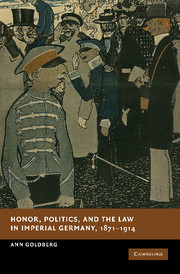3 - The state
Published online by Cambridge University Press: 03 May 2010
Summary
“Whether he is in a private office or a public bureau, the modern official always strives and usually enjoys a distinct social esteem as compared with the governed. His social position is guaranteed by the prescriptive rules of rank order and, for the political official, by special definitions of the criminal code against ‘insults of officials’ and ‘contempt’ of state and church authorities.”
That censorship in the Kaiserreich operated through defamation law is vaguely known but massively underappreciated and underresearched. Honor and its defense through libel actions were fundamental to state power. This was true at every level, from the Kaiser, who was not above suing an erstwhile flower girl and “prostitute,” down to the lowest village clerk and nightwatchman. The state wielded the defamation lawsuit unremittingly, harassing, disciplining, and silencing written and spoken, public and private speech.
Its most important tools were the Beamtenbeleidigung, §193, and the lèse-majesté clauses of the penal code. Formally, as we have seen, Beamtenbeleidigung no longer existed in the Criminal Code. In practice, it was ubiquitous. There was, it seems, a short period around the years of the Reich's founding when some courts had taken the new egalitarian direction in defamation law literally, refusing to grant libeled officials special treatment in the courts. Thus, in one controversial Saxon case, a Leipzig lower court in 1872 had denied a state prosecution of a newspaper (Volksstaat) that had allegedly libeled a district court and state attorney, treating the plaintiffs instead like regular citizens and directing them to the Privatklage and the (pre-1877) civil courts.
- Type
- Chapter
- Information
- Honor, Politics, and the Law in Imperial Germany, 1871–1914 , pp. 81 - 114Publisher: Cambridge University PressPrint publication year: 2010



